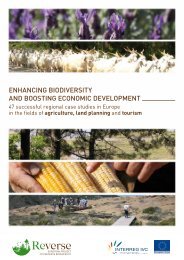agriculture - Reverse, European Project to Preserve Biodiversity
agriculture - Reverse, European Project to Preserve Biodiversity
agriculture - Reverse, European Project to Preserve Biodiversity
You also want an ePaper? Increase the reach of your titles
YUMPU automatically turns print PDFs into web optimized ePapers that Google loves.
MORE ABOUT REVERSE PROJECT<br />
The <strong>Reverse</strong> project is based on sharing experience among 14 <strong>European</strong> partners who are aware of the major challenges linking biodiversity<br />
and economic development. More specifically, it focuses on opportunities and insufficiencies in biodiversity conservation policies in three<br />
sec<strong>to</strong>rs: Agriculture and food production, Land planning, and Tourism.<br />
<strong>Reverse</strong> is a three-year <strong>European</strong> interregional cooperation project (January 2010 - December 2012). Lead by the Aquitaine Region, it<br />
involves seven <strong>European</strong> countries: Es<strong>to</strong>nia, France, Germany, Greece, Italy, Slovakia and Spain. It is co-financed by the <strong>European</strong> Regional<br />
Development Fund (ERDF) and made possible by the INTERREG IVC programme. As part of the <strong>European</strong> Terri<strong>to</strong>rial Cooperation Objective,<br />
the INTERREG IVC Programme (2007-2013) is an EU programme that helps regions of Europe work <strong>to</strong>gether <strong>to</strong> share their knowledge<br />
and experience.<br />
<strong>Reverse</strong> partners comprise regional authorities, public establishments, associations, research institutes and universities, which contribute<br />
<strong>to</strong> the conservation and development of wild and cultivated biodiversity. They work on various complementary subjects such as the<br />
conservation of species in situ, gene banks, the management of natural areas, region-wide strategies for the conservation of biodiversity,<br />
ecological corridors, local legislation for the protection of biodiversity, education, etc.<br />
Regions:<br />
Aquitaine Region (France)<br />
www.aquitaine.fr<br />
Bremen Region (Germany)<br />
www.umwelt.bremen.de<br />
Specialised organizations:<br />
Bio d’Aquitaine (France)<br />
www.bio-aquitaine.com<br />
Natural Areas Conserva<strong>to</strong>ry<br />
of Aquitaine - CEN Aquitaine (France)<br />
www.cen-aquitaine.fr<br />
Umbria Region (Italy)<br />
www.regione.umbria.it<br />
Mediterranean Agronomic Institute<br />
of Chania (Greece)<br />
www.maich.gr<br />
Decentralized Administration<br />
of Crete-Forest Direc<strong>to</strong>rate of<br />
Chania (Greece)<br />
www.crete-region.gr<br />
Es<strong>to</strong>nian University of Life Sciences-EMU (Es<strong>to</strong>nia)<br />
www.emu.ee<br />
Euskadi Region (Spain)<br />
www.euskadi.net<br />
The Plant Production Research Center<br />
Piešt’any - PPRC Piešt’any (Slovakia)<br />
www.cvrv.sk<br />
Region of East Macedonia and<br />
Thrace (Greece)<br />
www.remth.gr<br />
Murcia Region (Spain)<br />
www.murcianatural.carm.es<br />
Regional Agency for the Development<br />
and the Innovation of Agriculture in Lazio - ARSIAL (Italy)<br />
www.arsial.it<br />
Technology Transfer Centre<br />
Bremerhaven<br />
ttz Bremerhaven (Germany)<br />
www.ttz-bremerhaven.de



